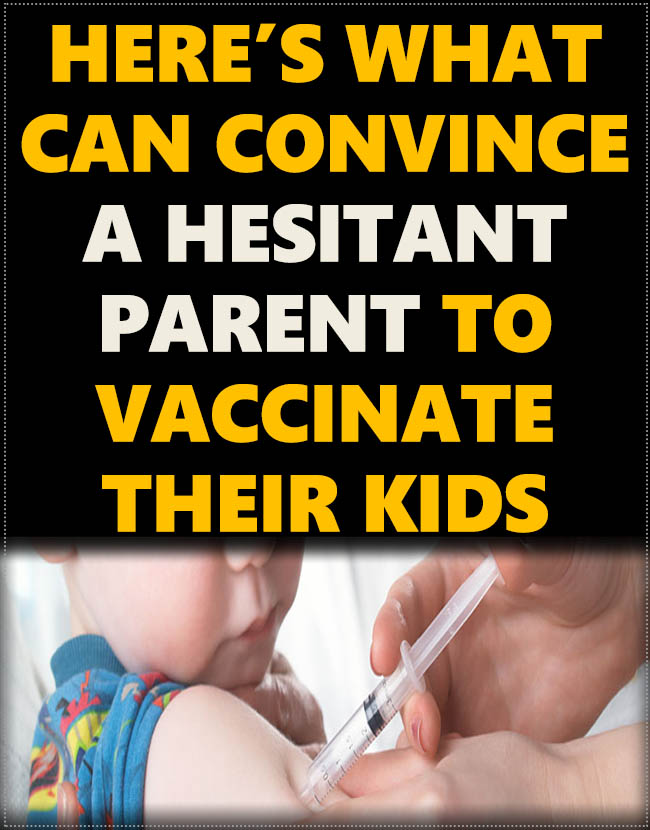
Here’s What Can Convince a Hesitant Parent to Vaccinate Their Kids
- A new report investigates what leads some parents change their minds about vaccinating their children.
- Researchers found proximity to an outbreak and whether or not people trusted their health officials as the main indicators.
- Health officials have been trying to fight measles cases in the U.S. that have surpassed 1,000.
What leads a parent to not vaccinate their children?
A new study looks at what goes into deciding whether or not to fully vaccinate.
According to a new report in the journal PLOS ONE, some parents may rethink their stance on not vaccinating their children if they live near an outbreak.
And for many parents the decision to vaccinate more often comes down to how they view public health authorities.

Dr. Florian Justwan, lead author and political science professor at the University of Idaho, conducted an online survey of more than 1,000 American adults in 2017.
“Trust in government medical experts makes people more likely to feel positive about vaccinations,” Justwan told Healthline of the results.
People who distrusted medical experts may have a more positive impression of vaccinating if they were near an outbreak. Proximity to an outbreak didn’t affect vaccination attitudes of people who trusted medical experts.
Other than outbreak proximity, Justwan believes that speaking with a pediatrician may be critical to change parents’ minds about vaccinating.
“There is still hesitancy,” he said. “Some parents are changing their minds, but it is difficult to know who is changing their mind because of institutional changes.” He noted regulations that vary by state, such as allowing non-medical exemptions that allow people to forego vaccinations.
Vaccine hesitancy and refusal
Dr. Daniel Salmon, a professor and director of the Institute for Vaccine Safety at the Johns Hopkins School of Public Health in Baltimore, Maryland, said the study highlights the issue of vaccine hesitancy more than people who are strictly against vaccines.
About a quarter to a third of parents are hesitant to vaccinate, Salmon told Healthline.
“These parents tend to underestimate the risks of diseases and overestimate the risks of vaccines,” Salmon said.
Well over 70 percent of American parents vaccinate their children according to the CDC’s schedule, said Patsy Stinchfield, a nurse practitioner and senior director of infection prevention and control for the Children’s Immunization Project and Wound Care Team at Children’s Hospitals and Clinics of Minnesota.
Some parents may delay vaccines, but parents tend to respond well to recommendations by groups such as the CDC and American Academy of Pediatrics.
There are only about 1 to 3 percent of parents who are against vaccines and whose children are mostly unvaccinated, Stinchfield said.
“This group is nearly impossible to change their minds because it has become part of their cultural norm to refuse vaccinations or spend much of their own time in an echo-chamber of other like-minded parents who support each other’s strongly held belief that vaccines cause more harm than good,” she explained.
Though their numbers are small, they have an active presence online and at legislative meetings.
About 25 percent of people are vaccine hesitant, she said. “They are who we need to do more to reach. They are confused, have heard dramatic stories on both sides of impact from diseases and reported impact on a child [that] a parent believes were caused by vaccines,” Stinchfield said.
“Many of the hesitant parents in the middle may do more bargaining or negotiating on vaccines such as waiting until their child is older, opting out of some but not all vaccines, and just seeking clarification over their confusion,” she said.
Doctors and healthcare professionals can do more to educate this group, and listen to how they feel about vaccines, she said.
Us vs. them perceptions?
Trust in public health authorities has an impact on vaccination attitudes and rates, Salmon said.
“It’s very hard to change people’s minds once they are made up,” he said. “We are much more likely to have a positive impact on how people view vaccines if we can inform people as they are forming their views.”
Stinchfield questioned how the researchers defined peoples’ impressions of the CDC.
As a volunteer on the quarterly Advisory Committee on Immunization Practices, she has met with CDC staffers for about 15 years.
“It’s hard for me to understand how we are so skeptical of an agency whose sole purpose is hire doctors, nurses, and epidemiologists to protect our health. There is not conspiracy there, no excess wealth, no dark motives,” she explained. “Because of my long, first-hand experiences, I have trust, not skepticism in the staff at the CDC and their mission for all of us.”
She saw how a local measles outbreak impacted vaccine rates in her state of Minnesota 2 years ago. MMR vaccinations went from about 2,000 a week to more than 10,000 a week during the outbreak.
Before the outbreak, the MMR was the primary vaccine being refused until the outbreak occurred.
“I have taken care of families fearful of vaccines where we went slow with the schedule and their seeing how well-tolerated the vaccines were, they finished the vaccine series on schedule,” she said.
Preventing more outbreaks
Stinchfield hopes the United States doesn’t have to witness more outbreaks in order for more people to get vaccinated.
“There’s still vaccine hesitancy,” she said, but senses that more people are speaking up in support of vaccines. “Theirs is an important voice we are hearing more from.”
“The amount of false information spouted on social media about vaccines needs curbing,” she said.
Most parents who are vaccine hesitant are trying to do what’s best for their child, and may be overwhelmed by the amount of misinformation on the internet and social media in particular, noted Beth Hoffman, a research assistant with the University of Pittsburgh Center for Research on Media, Technology, and Health.
“While some parents may be changing their minds in light of recent outbreaks, hesitancy is still a major public health issue,” she said.
-Healthline.com

The Journey of Your Child’s Vaccine


![[ID: Hx_A0iLhdr8] Youtube Automatic](https://bizimtube.com/wp-content/uploads/2021/03/id-hxa0ilhdr8-youtube-automatic-236x133.jpg)
![[ID: lp7w0UmpuIs] Youtube Automatic](https://bizimtube.com/wp-content/uploads/2021/03/id-lp7w0umpuis-youtube-automatic-236x133.jpg)
![[ID: s2-7T1TH-lY] Youtube Automatic](https://bizimtube.com/wp-content/uploads/2021/03/id-s2-7t1th-ly-youtube-automatic-236x133.jpg)
![[ID: b_lakC9M4UQ] Youtube Automatic](https://bizimtube.com/wp-content/uploads/2021/03/id-blakc9m4uq-youtube-automatic-236x133.jpg)
![[ID: r44yl6nPONs] Youtube Automatic](https://bizimtube.com/wp-content/uploads/2021/03/id-r44yl6npons-youtube-automatic-236x133.jpg)
![[ID: pAwto1YQjA8] Youtube Automatic](https://bizimtube.com/wp-content/uploads/2021/03/id-pawto1yqja8-youtube-automatic-236x133.jpg)
![[ID: XETG8azHiv4] Youtube Automatic](https://bizimtube.com/wp-content/uploads/2021/03/id-xetg8azhiv4-youtube-automatic-236x133.jpg)
![[ID: f3G_-S_2HUk] Youtube Automatic](https://bizimtube.com/wp-content/uploads/2021/03/id-f3g-s2huk-youtube-automatic-236x133.jpg)
![[ID: G8oWns54snA] Youtube Automatic](https://bizimtube.com/wp-content/uploads/2021/03/id-g8owns54sna-youtube-automatic-236x133.jpg)
![[ID: s0lIFXhu6aw] Youtube Automatic](https://bizimtube.com/wp-content/uploads/2021/03/id-s0lifxhu6aw-youtube-automatic-236x133.jpg)
![[ID: 4UTd2Ev8eYg] Youtube Automatic](https://bizimtube.com/wp-content/uploads/2021/03/id-4utd2ev8eyg-youtube-automatic-236x133.jpg)
![[ID: RKBGBjVJBxQ] Youtube Automatic](https://bizimtube.com/wp-content/uploads/2021/03/id-rkbgbjvjbxq-youtube-automatic-236x133.jpg)